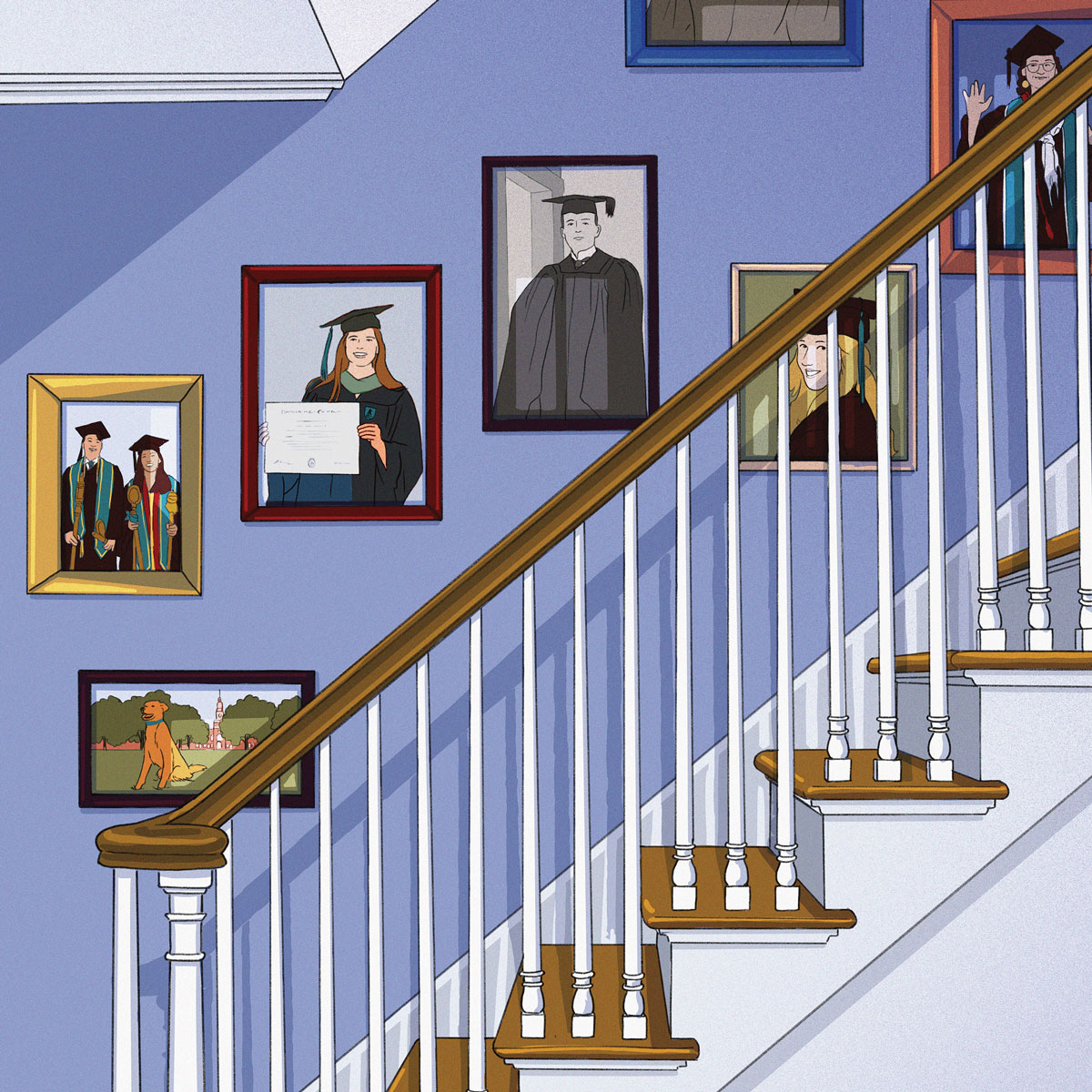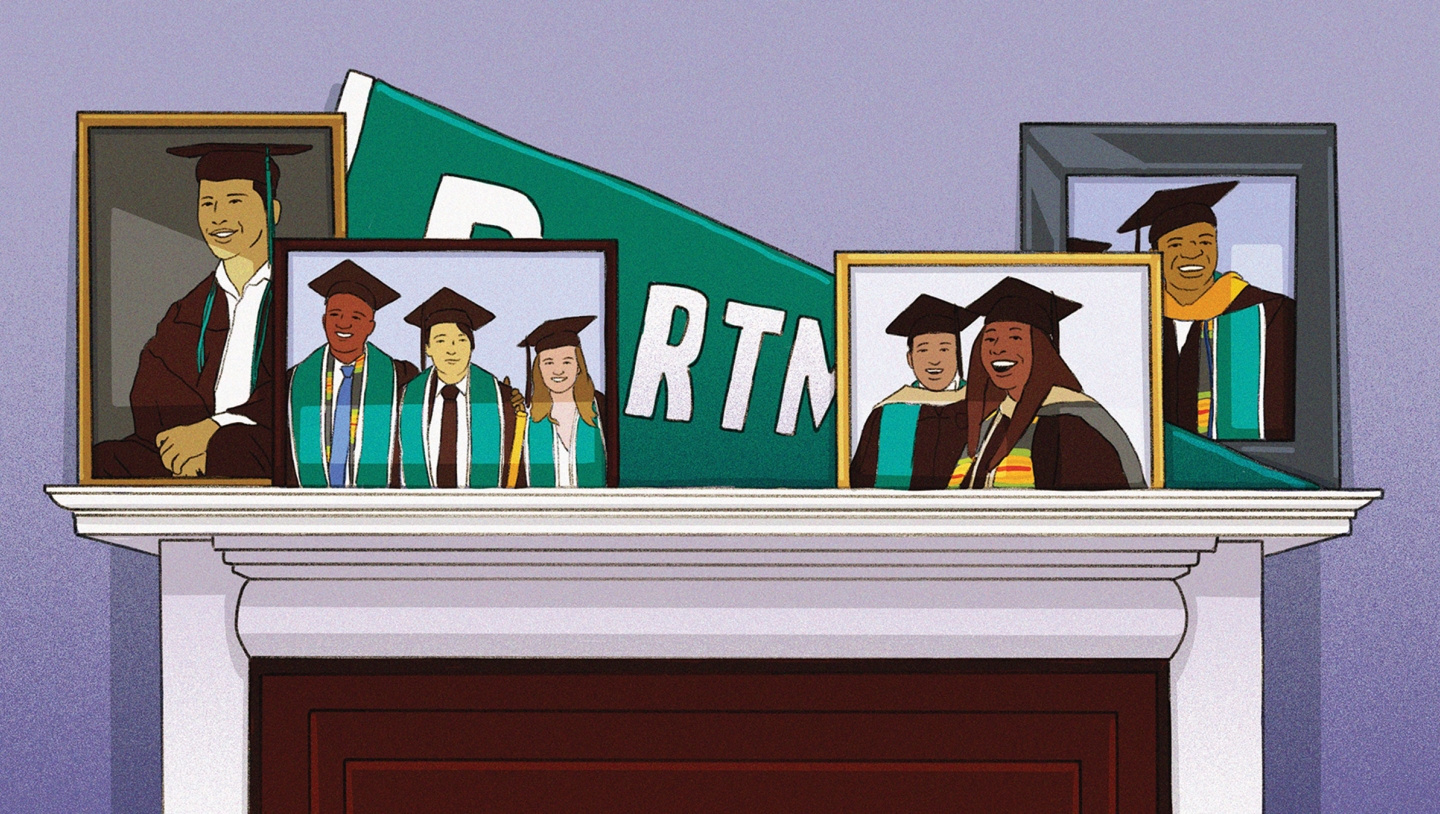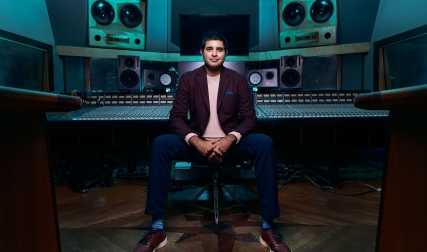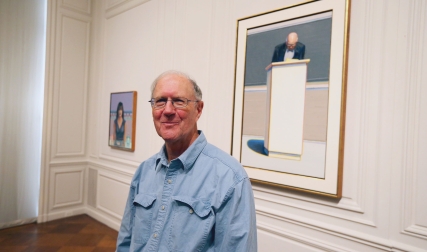On a brisk evening last fall in Washington, D.C., Amy Wilkinson ’78 met up with her brother, Monty Wilkinson ’83, and their 95-year-old father, Robert Wilkinson Jr. ’50, and together they made their way past the gleaming marble pillars of the Salamander Hotel lobby. Guided by festive hostesses waving green placards with the Dartmouth “D” logo, the Wilkinsons descended to a luxurious basement ballroom for a VIP reception hosted by the new College president, Sian Beilock. This quintessential Dartmouth family had come to size her up and hear her vision for guiding the College forward at a time of global upheaval and change.
The Wilkinsons are an accomplished trio. Amy, an attorney, served in the Clinton administration and helped oversee public housing in Baltimore. Monty’s career in the U.S. Department of Justice included a stint as acting attorney general at the launch of the Biden administration. Their father practiced internal medicine for more than four decades while volunteering in a clinic for indigent patients. Their extended Dartmouth lineage includes Robert’s father, class of 1924, and uncle, class of 1928.
Surrounded by floor-to-ceiling photo projections of Dartmouth Hall and Baker Tower, the three sank into auditorium seats. Their shared experience had drawn them close, again and again, through a lifetime.
“I come from a family that really appreciates Dartmouth and feels a real connection to Dartmouth, and I think that has a lot to do with the fact that we’re a legacy family,” says Amy.
More than a century ago, Dartmouth was one of the first colleges in the nation to bestow advantages to children of alums. Graduates such as the Wilkinsons have long valued the practice as a way to nurture generational loyalty. But these days legacy favoritism faces an unprecedented legal and political backlash from those who see it as unfair and outdated. In the aftermath of the 2023 U.S. Supreme Court decision blocking colleges and universities from using racial data to admit students (cases were brought against Harvard and the University of North Carolina), legacy admissions are under more scrutiny than ever.
On this particular evening, Beilock settled in for a fireside chat with Neal Katyal ’91, a Dartmouth trustee and Supreme Court specialist who has worked with Yale University on its admissions policies in recent years. Onstage, their conversation wound through a list of hot-button issues of the moment—her thoughts on the future of Greek Life, navigating the Israel-Hamas war, the challenge of maintaining student mental health. Beilock confidently addressed controversial subjects without restraint or apology, speaking with candor and, at times, intimacy. The conversation came to a close with resounding applause. Legacy admissions never came up.
That’s likely to change, and soon.
A ruling against Harvard could have an instant ripple effect across higher education.
Less than a week after the high court announced its 2023 opinion, a nonprofit based in Boston, Lawyers for Civil Rights, filed a complaint against Harvard with the U.S. Department of Education on behalf of Black and Latino college applicants. They allege that the school’s admissions system violates the federal Civil Rights Act.
“We were ready to go,” says Michael Kippins, an attorney with the organization, which had been eyeing legacy admissions for years. “We thought it was high time to break down barriers that would stand in the way of applicants of color.” The complaint included 2019 admissions data produced during the 2023 affirmative action case that showed that nearly 70 percent of Harvard’s donor-related and legacy applicants were white, and that legacy applicants were nearly six times more likely to be admitted than the general applicant pool.
Other research shows that legacy admissions mostly help students from families within the top 1 percent of American earners. Data analysts at a Harvard-based organization called Opportunity Insights have found that such students are five times more likely to be admitted than the average applicant with similar test scores, demographic characteristics, and admissions office ratings. The Brookings Institution cites public surveys that indicate 75 percent of Americans oppose legacy admissions and concludes that the approach is “straightforwardly un-meritocratic.” Among the thinkers making the most noise on the subject is Robert Reich ’68, a former U.S. secretary of labor. Reich rails against the practice in op-eds and on Substack. And in a four-minute YouTube video he eviscerates legacy admissions, saying the practice creates “a vicious cycle that consolidates wealth and power in the hands of a few.” Reich supports a federal ban on legacy admissions.
Some schools took unilateral action after the Supreme Court ruling. Wesleyan University announced it would formally end admission preferences for legacies. Carleton and Occidental made similar changes. At Yale, President Peter Salovey admitted that “everything is up for discussion” in this new era of admissions. “We are trying to ask, ‘Is [legacy admissions] getting in the way of diversifying our applicant pool or is it not?’ ” he said. “We will make the decision on the basis of that, rather than what the political pressure is. But the political pressure is not completely irrelevant.”
State legislatures also jumped into the mix. In March, Virginia outlawed legacy admissions at the state’s flagship university, which enjoys a robust alumni body. Colorado and Maryland passed bans. California, Connecticut, Massachusetts, New York, and Minnesota all have state bans under consideration.
The case before the U.S. Department of Education remains pending. A ruling against Harvard could have an instant ripple effect across higher education. “I think schools will certainly be watching,” says Kippins.

Legacy admissions did not originate out of a desire to cultivate generational loyalty among graduates, nor were they meant to juice wealthy alums into donating more money. In 2011, researchers from Purdue University traced the legacy admissions policy at Dartmouth to 1922, a time when elite universities were imposing entry restrictions apparently aimed at thinning a wave of Jewish immigrants from entering the Ivy League. Though the College never overtly stated the reason for the legacy policy, much could be deduced from the timing, “one of the most nativist periods in U.S. history,” according to the researchers.
Whatever the original motivation for legacy admissions, alumni sentiment has long since hardened in support of this built-in advantage for their offspring. In the past decade, the presence of students whose parents or siblings attended Dartmouth has fluctuated between 11 and 14 percent of those who enroll. If the College has any formal research that measures alumni sentiment about the practice, none has been made public. But in unscientific and informal conversations with a range of alums, including many who are not legacies, it’s clear that many think the practice is fine—as long as nobody who isn’t qualified gets admitted. (As for data that correlates legacy families with donations to their alma mater, there is little to be found. However, schools that have recently dropped legacy admissions say they’ve seen no effect on fundraising.)
In 2010, the progressive Harvard-trained lawyer Robert H. Kahlenberg edited one of the first books trained squarely on the longstanding tradition of legacy favoritism in college admissions. He called the book—and the practice—Affirmative Action for the Rich. In it, Kahlenberg lays out a series of arguments equating the preferences afforded to the children of alumni to the “hereditary privileges of the old world”—a fundamentally unfair arrangement that benefits young people based solely on their bloodlines, and not their grit, talent, or intellect. The practice was, in his view, anti-American to the core.
The issue has remained on the periphery of a broader debate about college admissions, with the 2019 Varsity Blues scandal, rising tuitions, the value of the SAT, and affirmative action dominating the conversation. But the seeds were planted. Years before it would come to pass, Kahlenberg predicted that a long-running effort to end race-based affirmative action in college admissions would eventually force questions about legacy advantages out into the open. If the Supreme Court were to act, he prophesied, “legacy preferences will come under new pressure…[and] may well be swept aside.”
Kahlenberg told DAM earlier this year that he had spent the bulk of his career focused on trying to improve opportunities for disadvantaged students. He became convinced that admissions preferences for children of alumni “represented the antithesis of what I’d been fighting for,” he says. Even though polling indicated most Americans objected to the idea of legacy preferences, his advocacy failed to gain traction. During the 2008 presidential campaign, Kahlenberg heard President Barack Obama suggest his own daughters did not deserve any special preference that might place them ahead of disadvantaged students for a spot in college. After Obama was elected, Kahlenberg reached out to a friend in the administration to press for action. “She inquired and reported back that, given interest-group politics, Obama could not follow through,” Kahlenberg says. “Litigation seemed the only path forward.”
The left-leaning Kahlenberg eventually found himself in common cause with a right-leaning thinker who was leading the charge to undo affirmative action in college admissions. That man, Edward Blum, and his organization, Students for Fair Admission (SFFA), were waging the scorched-earth legal fight against Harvard’s race-conscious admissions policies that led to the 2023 ruling in SFFA’s favor and threw the admissions world into a collective panic. SFFA argued that schools “could obtain significant racial diversity without resorting to race-based admissions practices…by reducing legacy preferences [and] increasing financial aid.”
Blum, a neoconservative from Texas who has dabbled in politics, says that as controversial as the movement against affirmative action has been, it was that argument about legacy admissions that seemed to weigh most heavily on a close friend of his—a Dartmouth alum—with whom he debated on a golf course fairway recently in Maine. The two typically see eye to eye about higher education policy, but they part on legacies. “He is a very proud alumnus who has a different opinion and readily admits that he wants his kids to go to Dartmouth. Every little element that can help make that happen, for him, is a good thing.”
“The misperception is that someone who is the child of an alum is less qualified for admission than everybody else. And that’s not true.”
As the arguments gather momentum in courts and statehouses, the Dartmouth administration has made no overt moves to stake out a position on legacy admissions. “This is incredibly sensitive,” says a faculty member who wishes to remain anonymous. In the months of reporting for this article, College officials denied repeated requests to comment. Although the Supreme Court ruling led to Dartmouth admissions officers presenting a briefing on the issue to trustees, the details remain secret. The intent, however, was to help the College and its new president set a course as the topic garners increased attention.
Lee Coffin, Dartmouth’s dean of admissions, has spoken about legacy admissions in his podcast, Admissions Beat. In the September 12, 2023, episode, Coffin discusses the high court’s 2023 affirmative action ruling with his guest, Southern Methodist University admissions dean Elena D. Hicks. “For us, it’s not about taking a legacy student over someone else. One has to be clearly admissible,” says Hicks. “We love that our alumni bring their students back and that those students apply to SMU, but it doesn’t mean those students are taking a spot from someone else who is clearly maybe a better fit.”
Coffin voices approval. “I would expand a little bit to say we’re building community on our campuses,” he says. “Alumni are part of the lifelong community, particularly of a private institution. The children of those graduates are often really important members of the community. And the misperception that I often encounter is that someone who is the child of an alum is less qualified for admission than everybody else. And that’s not true.”
Coffin returned to the subject again during another podcast episode two months later. Guest Angel B. Pérez, CEO of the National Association for College Admission Counseling, notes a growing constituency of the alumni body that should not be discounted in any legacies debate: families of color. Perez recounts a frequent complaint he hears from such families: “Now that we actually have another generation, and we’ve gained access into these institutions, now you’re going to take this away?” Coffin expresses agreement and describes the legacy applicant pool as a lagging indicator. “When you think about the parents of high school seniors, they’re increasingly people who graduated from high school and college in the mid to late 1990s and early 2000s,” he says. “[Campuses] became much more diverse places during that era. The diversity of higher ed is going to show up more and more directly in that legacy pool over time.”
Perez weighs in with a final thought: “I am a bigger fan of institutions doing the soul-searching internally. I really would prefer that institutions did that work and created their policies as opposed to creating a national mandate.” Coffin did not disagree.
“While my legacy status has its perks—for which I am incredibly grateful—I am always embarrassed to admit to the deep roots my family has in Hanover.”
What do current students think? In April, The Dartmouth published polling that showed 58 percent of undergrads believe the College should end legacy admissions. Student op-eds have argued against the practice. Back in 2022, Emily Wadlow ’26 wrote that as a first-year student she felt self-conscious about being a legacy. “Unfortunately, my parents went to Dartmouth. So did two of my grandfathers, two aunts, and an uncle. If you cut me open, I’d probably bleed green,” she wrote. “While my legacy status has its perks—for which I am incredibly grateful—I am always embarrassed to admit to the deep roots my family has in Hanover. It is not rare for someone to say ‘Oh, of course you got into Dartmouth! You’re a legacy legacy!’ ”
An increasing number of students feel uncomfortable with the “Scarlet L,” according to Kahlenberg. “On selected campuses there is a stigma,” he says, “because people know how the world works, and they got an unfair preference.”
Last February, four members of the class of 2026 scrunched into a corner booth at Sawtooth Kitchen, the sub-level grill beneath what used to be the Dartmouth Bookstore. I had offered to ply them with burgers and sodas in exchange for a candid discussion about legacy admissions. Full disclosure: A legacy was among them—my son, Bennett ’26.
The sophomores were well acquainted with the controversy surrounding the practice, and all four supported the premise that admittance to Dartmouth should, first and foremost, be earned and not inherited. “I’m very partial to a meritocracy,” said Jake Zrihen ’26. “That’s how I feel about it. If it’s causing more-qualified candidates to be overlooked, then I would have a problem with it. But it’s hard to know if that’s the case.”
They admitted to ribbing some legacies they know. “I’d be lying if I said that never happened,” said Mason King ’26. But it was no different than another friend of theirs who was recruited to the swim team. “He’s really sensitive about people thinking he only got in here because he’s a good swimmer,” said Bennett.
Varun Swaminathan ’26 explained that similar feelings of insecurity are nearly universal on a campus full of overachievers. “I think the whole identity crisis is very real for every student, just because you’re surrounded by so many accomplished people that you’re never really sure if you’re truly deserving,” he said. “I think considering legacy admissions from the base of creating a culture of community and family at Dartmouth is not necessarily a bad thing. And as Dartmouth grows more diverse, in 30 years, the pool of legacy applicants is going to look even more diverse. I think it’s fairly neutral in terms of diversity.”
Without a doubt these students had their eyes on the future. They want a fair admissions process and more diversity in the applicant pool. They also want to share their Dartmouth experience with their children. “Once you’re here, you fall in love with the school and traditions and the culture, and you want more people in your family to experience it,” said Swaminathan. “I’m not a legacy, but I still want my family to end up here. Once you’ve actually had the experience, it’s hard to think of them taking away anything that would help your family have that experience too.”
Matthew Mosk is senior investigative editorial director at CBS News. He lives in Maryland.



